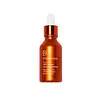What's inside
What's inside
 Key Ingredients
Key Ingredients

 Benefits
Benefits

 Concerns
Concerns

 Ingredients Side-by-side
Ingredients Side-by-side

Water
Skin ConditioningEthylhexyl Palmitate
EmollientIsopropyl Palmitate
EmollientGlycerin
HumectantCaprylic/Capric Triglyceride
MaskingButyrospermum Parkii Butter
Skin ConditioningPropanediol
SolventGlyceryl Stearate Se
EmulsifyingCetearyl Alcohol
EmollientSodium Hyaluronate
HumectantEctoin
Skin ConditioningSodium Hyaluronate Crosspolymer
HumectantPalmitoyl Tetrapeptide-7
Skin ConditioningPalmitoyl Tripeptide-1
Skin ConditioningHeptapeptide-6
Skin ConditioningSodium Acetylated Hyaluronate
HumectantHydrolyzed Sodium Hyaluronate
Skin ConditioningResveratrol
AntioxidantLinolenic Acid
CleansingLinoleic Acid
CleansingCeramide NP
Skin ConditioningCeramide AP
Skin ConditioningCeramide EOP
Skin ConditioningPhytosphingosine
Skin ConditioningPhospholipids
Skin ConditioningLeontopodium Alpinum Callus Culture Extract
AntioxidantSimmondsia Chinensis Seed Oil
EmollientAvena Sativa Kernel Oil
Skin ConditioningSqualane
EmollientSaccharide Isomerate
HumectantAdenosine
Skin ConditioningDimethyl Isosorbide
SolventEthylhexylglycerin
Skin ConditioningPentylene Glycol
Skin ConditioningButylene Glycol
HumectantCetearyl Glucoside
EmulsifyingSodium Stearoyl Glutamate
CleansingGlyceryl Undecylenate
EmollientGlyceryl Caprylate
EmollientCaprylyl Glycol
EmollientCholesterol
EmollientCarbomer
Emulsion StabilisingCoco-Glucoside
CleansingSodium Lauroyl Lactylate
EmulsifyingAmmonium Acryloyldimethyltaurate/Vp Copolymer
Sodium Lactate
BufferingHydroxyapatite
AbrasiveSodium Hydroxide
BufferingSodium Polyacrylate
AbsorbentXanthan Gum
EmulsifyingChlorphenesin
AntimicrobialSodium Citrate
BufferingCitric Acid
BufferingSodium Gluconate
Skin ConditioningPhenoxyethanol
PreservativeWater, Ethylhexyl Palmitate, Isopropyl Palmitate, Glycerin, Caprylic/Capric Triglyceride, Butyrospermum Parkii Butter, Propanediol, Glyceryl Stearate Se, Cetearyl Alcohol, Sodium Hyaluronate, Ectoin, Sodium Hyaluronate Crosspolymer, Palmitoyl Tetrapeptide-7, Palmitoyl Tripeptide-1, Heptapeptide-6, Sodium Acetylated Hyaluronate, Hydrolyzed Sodium Hyaluronate, Resveratrol, Linolenic Acid, Linoleic Acid, Ceramide NP, Ceramide AP, Ceramide EOP, Phytosphingosine, Phospholipids, Leontopodium Alpinum Callus Culture Extract, Simmondsia Chinensis Seed Oil, Avena Sativa Kernel Oil, Squalane, Saccharide Isomerate, Adenosine, Dimethyl Isosorbide, Ethylhexylglycerin, Pentylene Glycol, Butylene Glycol, Cetearyl Glucoside, Sodium Stearoyl Glutamate, Glyceryl Undecylenate, Glyceryl Caprylate, Caprylyl Glycol, Cholesterol, Carbomer, Coco-Glucoside, Sodium Lauroyl Lactylate, Ammonium Acryloyldimethyltaurate/Vp Copolymer, Sodium Lactate, Hydroxyapatite, Sodium Hydroxide, Sodium Polyacrylate, Xanthan Gum, Chlorphenesin, Sodium Citrate, Citric Acid, Sodium Gluconate, Phenoxyethanol
Water
Skin ConditioningDipropylene Glycol
HumectantAscorbic Acid
AntioxidantDimethyl Isosorbide
SolventRicinoleth-40
CleansingAminomethyl Propanol
BufferingLactic Acid
BufferingTocopherol
AntioxidantGlycyrrhiza Glabra Root Extract
BleachingFerulic Acid
AntimicrobialMorus Alba Fruit Extract
AntioxidantSodium Hyaluronate
HumectantGlycolic Acid
BufferingAdenosine
Skin ConditioningGlycerin
HumectantPhenoxyethanol
Preservative
 Reviews
Reviews

Ingredients Explained
These ingredients are found in both products.
Ingredients higher up in an ingredient list are typically present in a larger amount.
Adenosine is in every living organism. It is one of four components in nucleic acids that helps store our DNA.
Adenosine has many benefits when used. These benefits include hydrating the skin, smoothing skin, and reducing wrinkles. Once applied, adenosine increases collagen production. It also helps with improving firmness and tissue repair.
Studies have found adenosine may also help with wound healing.
In skincare products, Adenosine is usually derived from yeast.
Learn more about AdenosineDimethyl Isosorbide is a low-irritation solvent that helps deliver actives into your skin. It is created from glucose.
Research shows how well this ingredient works depends on the active and formulation rather than the concentration alone. This means adding more Dimethyl Isosorbide does not guarantee better penetration of ingredients into the skin.
Glycerin is already naturally found in your skin. It helps moisturize and protect your skin.
A study from 2016 found glycerin to be more effective as a humectant than AHAs and hyaluronic acid.
As a humectant, it helps the skin stay hydrated by pulling moisture to your skin. The low molecular weight of glycerin allows it to pull moisture into the deeper layers of your skin.
Hydrated skin improves your skin barrier; Your skin barrier helps protect against irritants and bacteria.
Glycerin has also been found to have antimicrobial and antiviral properties. Due to these properties, glycerin is often used in wound and burn treatments.
In cosmetics, glycerin is usually derived from plants such as soybean or palm. However, it can also be sourced from animals, such as tallow or animal fat.
This ingredient is organic, colorless, odorless, and non-toxic.
Glycerin is the name for this ingredient in American English. British English uses Glycerol/Glycerine.
Learn more about GlycerinPhenoxyethanol is a preservative that has germicide, antimicrobial, and aromatic properties. Studies show that phenoxyethanol can prevent microbial growth. By itself, it has a scent that is similar to that of a rose.
It's often used in formulations along with Caprylyl Glycol to preserve the shelf life of products.
Sodium Hyaluronate is hyaluronic acid's salt form. It is commonly derived from the sodium salt of hyaluronic acid.
Like hyaluronic acid, it is great at holding water and acts as a humectant. This makes it a great skin hydrating ingredient.
Sodium Hyaluronate is naturally occurring in our bodies and is mostly found in eye fluid and joints.
These are some other common types of Hyaluronic Acid:
Learn more about Sodium HyaluronateWater. It's the most common cosmetic ingredient of all. You'll usually see it at the top of ingredient lists, meaning that it makes up the largest part of the product.
So why is it so popular? Water most often acts as a solvent - this means that it helps dissolve other ingredients into the formulation.
You'll also recognize water as that liquid we all need to stay alive. If you see this, drink a glass of water. Stay hydrated!
Learn more about Water